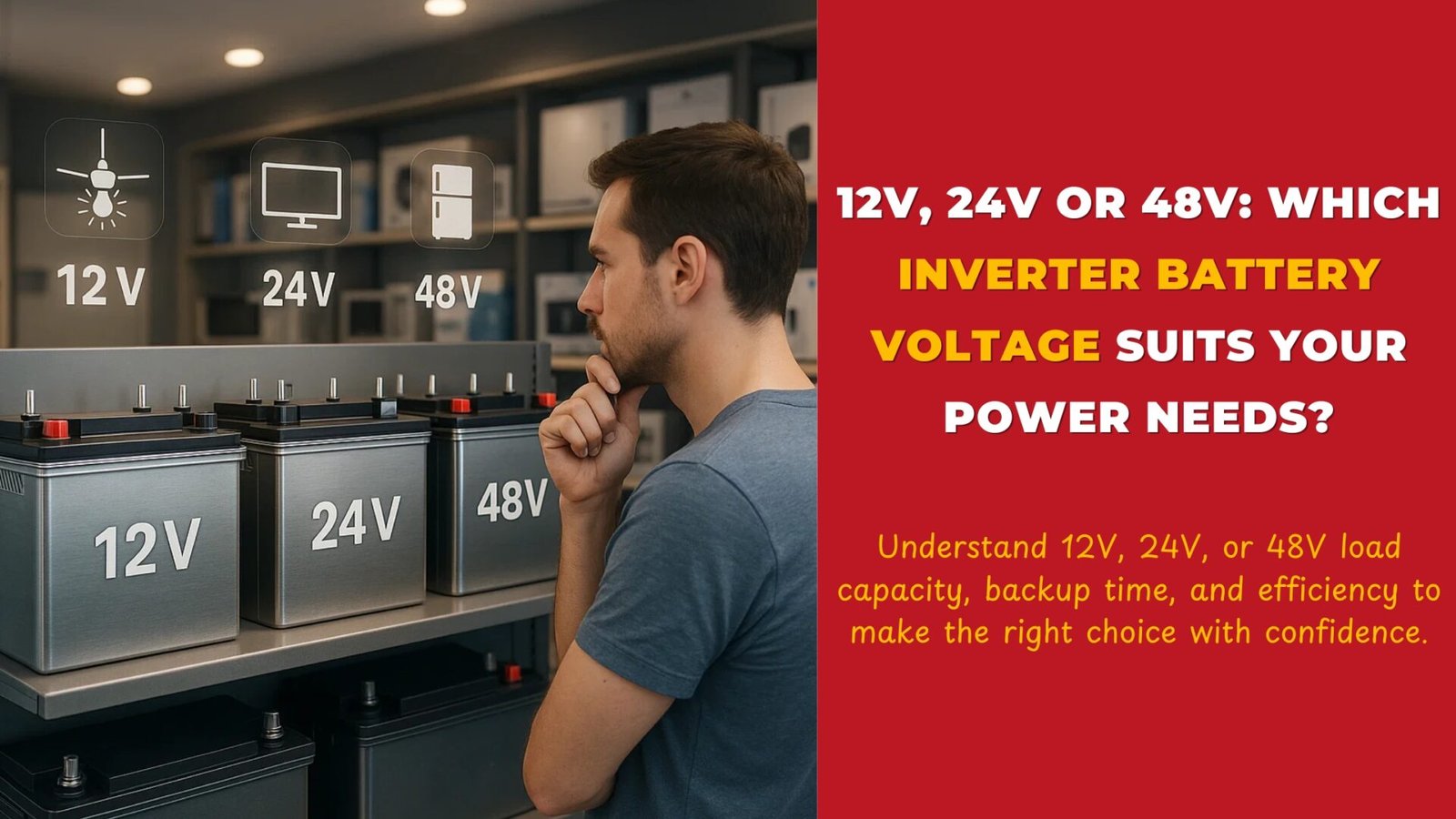When it comes to power backup, one of the most common questions is: Should I choose a 12V, 24V, or 48V inverter battery voltage?
The choice isn’t just about numbers — it affects how much load your inverter can handle, the backup time you get, safety, and the overall cost of installation. A wrong choice may lead to frequent power cuts, overheating, or higher long-term expenses.
In this blog, we’ll break down the differences between 12V vs 24V vs 48V inverter battery voltage in simple terms, highlight their pros and cons, and give you expert tips to help you decide which setup best suits your needs at home or work.
Basics of Inverter Battery Voltage
An inverter battery voltage simply refers to the voltage rating of the entire backup system. It decides how much load the inverter can handle and how efficiently it operates.
- 12V System: Works with a single 12V battery.
- 24V System: Uses two 12V batteries connected in series.
- 48V System: Requires four 12V batteries in series.
The higher the voltage, the better the system efficiency and load-handling capacity. However, it also means more upfront cost and careful installation. That’s why knowing your requirements is key before making a decision.
Deep Dive: 12V Inverter Battery
Who should choose it?
Perfect for small households or budget-conscious buyers who only need basic backup.
Pros:
- Affordable and easy to set up
- Widely available and service-friendly
- Good for light usage (fans, lights, TV)
Cons:
- Limited backup for heavy loads
- Higher current flow → more heat in wiring
- Not ideal for future upgrades
Example Use Case: A 1BHK apartment with 2–3 fans, LED lights, and a TV.
Deep Dive: 24V Inverter Battery
Who should choose it?
A great mid-range option for medium-sized homes or small shops with moderate power needs.
Pros:
- More efficient than 12V systems
- Handles higher loads without stress
- Less heat generation, longer battery life
Cons:
- Slightly higher setup cost
- Requires two batteries, so more space needed
Example Use Case: A 2–3BHK home or a small office running computers, fans, and lighting together.
Deep Dive: 48V Inverter Battery
Who should choose it?
Designed for large homes, offices, and commercial setups where uninterrupted power is crucial.
Pros:
- High efficiency and stable power output
- Supports heavy loads like AC, refrigerators, and multiple appliances
- Reduced wiring issues due to lower current flow
Cons:
- High initial investment
- Needs four batteries and more space
- Professional installation required
Example Use Case: A large house with multiple ACs, fridge, water pump, and work-from-home setups.
Comparison Table – 12V vs 24V vs 48V Inverter Battery
| Feature | 12V System | 24V System | 48V System |
| No. of Batteries | 1 (12V) | 2 (12V x 2) | 4 (12V x 4) |
| Load Capacity | Low (Fans, lights) | Medium (TV, computers) | High (AC, fridge, multiple devices) |
| Backup Time | Short | Medium | Long & stable |
| Cost | Low | Moderate | High |
| Best For | Small homes, budget | Mid-sized homes, shops | Large homes, offices |
Key Factors to Decide
Before choosing your system, consider these points carefully:
- Backup Requirement: Do you need 2–3 hours of power or 6–8 hours? Longer backup = higher voltage system.
- Load Requirement: List appliances you want to run. Fans + lights = 12V; add TV + computer = 24V; add AC + fridge = 48V.
- Space & Ventilation: More batteries require proper placement with ventilation to prevent overheating.
- Budget: 12V is affordable upfront but less efficient; 24V balances cost and performance; 48V saves in the long run but costs more initially.
- Installation Needs: 48V systems should always be installed by professionals for safety and efficiency.
Expert Tips for Buyers
- Think long-term, not just cost: A slightly higher investment can give better efficiency and longer battery life.
- Ensure proper installation: Avoid loose connections or undersized wires that cause voltage drops.
- Focus on ventilation: Batteries release gases, so a well-ventilated area is a must.
- Consult an installer: Always seek professional guidance before upgrading from 12V to 24V or 48V.
- Safety matters: Never overload the inverter beyond its rated capacity.
Conclusion
Choosing the right inverter battery voltage between 12V, 24V, or 48V depends on your household or business requirements.
- 12V → Small needs, budget-friendly.
- 24V → Balanced choice for mid-range usage.
- 48V → High-demand setups needing stable, long backup.
Always assess your power needs, available space, and budget before deciding. For safety and efficiency, professional installation is strongly recommended. The right inverter battery system will ensure peace of mind and uninterrupted power during outages.
Looking for a reliable inverter battery voltage solution for your home or office? Explore high-quality 12V, 24V, and 48V inverter batteries at Vaibhav Enterprises. Get trusted brands, expert guidance, and personalized support to ensure uninterrupted power backup.

